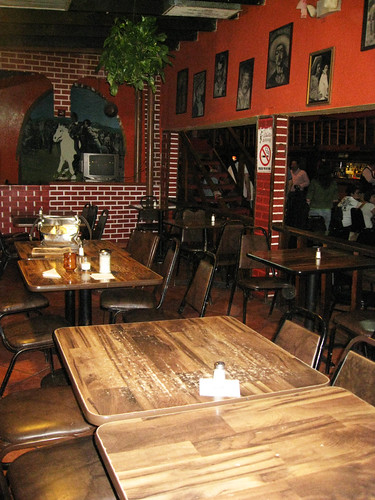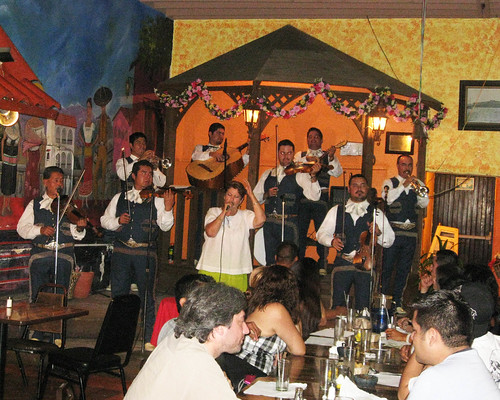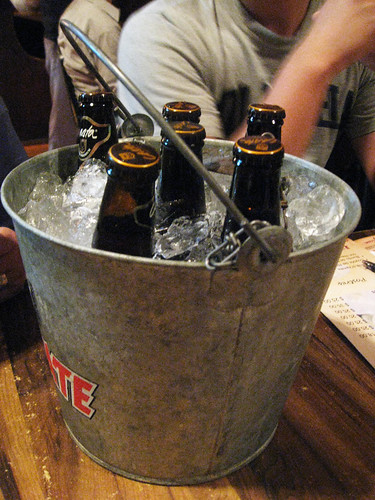Sunday, November 15, 2009
¡Baja Delicioso! The History of Mariachi and Late Night Mariachi at La Vuelta
Last August, I posted the first of my ¡Baja Delicioso! series where I talked about the ultimate Carne Asada Taco, but life, a new job and other responsibilities took over and I fell a bit behind. It's time to rectify that situation. After scarfing down both a carne asada taco and tostada at our first destination, we were driven over to La Vuelta, also in Tijuana.
More ...
La Vuelta is open 24 hours, but what they're known for is a house mariachi band that will play until 2 am every night but before I talk more about our time at La Vuelta, I thought I'd give you a little mariachi history lesson reprinted from www.mariachi.org.
The Wedding of Musical Traditions
Prior to the arrival of Cortes the music of Mexico, played with rattles, drums, reed and clay flutes, and conch-shell horns, was an integral part of religious celebrations. Quickly, however, as Christianity spread, in many areas these instruments gave way to instruments imported by the Spanish: violins, guitars and harps, brass horns, and woodwinds. The Indian and mestizo musicians not only learned to play European instruments, but also to build their own, sometimes giving them shapes and tunings of their own invention.
Mariachi - What Does It Mean?
Musicologists and folklorists have argued for years over the origin of the word - Mariachi. Currently, the best scholarly opinion is that the word mariachi has native roots. In fact, one theory is that it comes from the name of the wood used to make the platform on which the performers danced to the music of the village musicians.
The Unique Make-Up of the Mariachi Ensemble
In the complete Mariachi group today there are as many as six to eight violins, two trumpets, and a guitar - all standard European instruments. Then there is a high-itched, round-backed guitar called the vihuela, which when strummed in the traditional manner gives the Mariachi its typical rhythmic vitality; a deep-voiced guitar called the guitarró which serves as the bass of the ensemble; and a Mexican folk harp, which usually doubles the base line, but also ornaments the melody. While these three instruments have European origins, in their present form they are strictly Mexican.
The Beginning of the Mariachi We Know Today
Although the origins of Mariachi music go back hundreds of years, in the form we know it the Mariachi began in the nineteenth century in the Mexican state of Jalisco - according to popular legend, in the town of Cocula. The Mariachi was the distinctive version of the Spanish theatrical orchestra of violins, harp and guitars which developed in and around Jalisco. In other areas such as Veracruz and the Huasteca region in the northeast, the ensemble evolved differently. By the end of the nineteenth century, in Cocula the vihuela, two violins, and the guitarrón (which had replaced the harp) were the instruments of the Mariachi.
Coming of Age: Mariachi Vargas
Until the 1930's Mariachi groups were local and semi-professional. They were almost entirely unknown outside their own region. This began to change about 60 years ago, when the Mariachi Vargas de Tecalitlán, founded by Gaspar Vargas in 1898, went from Jalisco to Mexico City. They were invited to play at the inauguration in 1934 of populist President Lázaro Cárdenas, one of whose great interests was to foster the native culture of Mexico. Catching the Presidents enthusiasm, urban sophisticates took the folk arts to their hearts, and the Mariachi Vargas instantly became the toast of the town and spawned a musical tradition that has is now an important part of Mexican culture.
La Vuelta
Hopefully, you enjoyed learning more about this Mexican musical tradition so now, let's get back to La Vuelta. When we arrived at La Vuelta and made our way into their larger dining area, we were greeted by the sounds of a mariachi band, performing on a gazebo-like stage.
Once seated, the restaurant sent over complimentary tortilla chips and salsa and beef taquitos along with our choice of beers. The majority of us opted for the Casta beer and while we nibbled and sipped, we sat back and enjoyed the performance.
The food at La Vuelta was solid, if not spectacular, but in the end, it's not really about the food. It's more about finding a late night spot becaue you're still not quite ready to turn in yet. A few appetizers, a beer or two or more and enjoying the lively music and singing of a mariachi band is certainly not a bad way to end your night.
By the time we left La Vuelta, it was around 1:30 am. I was definitely ready for a good night's sleep for tomorrow was going to be an early start time where the first activity of the day was going to be a Tijuana City Tour. More to follow.
La Vuelta
Ave, Revolucion y Calle 1, #2004
Centro
Tijuana, Mexico
www.restaurantlavuelta.com
Click Here to See the Photos of the Entire Trip!
¡Baja Delicioso!
- Introduction and the Ultimate Carne Asada Taco at Tacos El Poblano
- The History of Mariachi and Late Night Mariachi at La Vuelta
- TJ City Tour, Cuban Cigars, Chili Shrimp Tacos and Churros
- From Spain to Argentina to My First Taste of Baja Med Cuisine
Disclaimer: Sponsored by the Tijuana Visitors and Convention Bureau along with the support of the Crossborder Business Associates, Cotuco (Tijuana Tourism Board) and the Tijuana Canirac (Tijuana Restaurant Association). This sponsorship took the form of these organizations paying for our travel arrangements, our hotel accomodations and all our meals.
^
Bookmark this post:blogger tutorials
Social Bookmarking Blogger Widget |
Subscribe to:
Post Comments (Atom)




















1 comment:
La historia es excelente fuera de lo común además la interpretaciones musicales están muy acordes con la cultura musical de México. Qué buena información.
Post a Comment